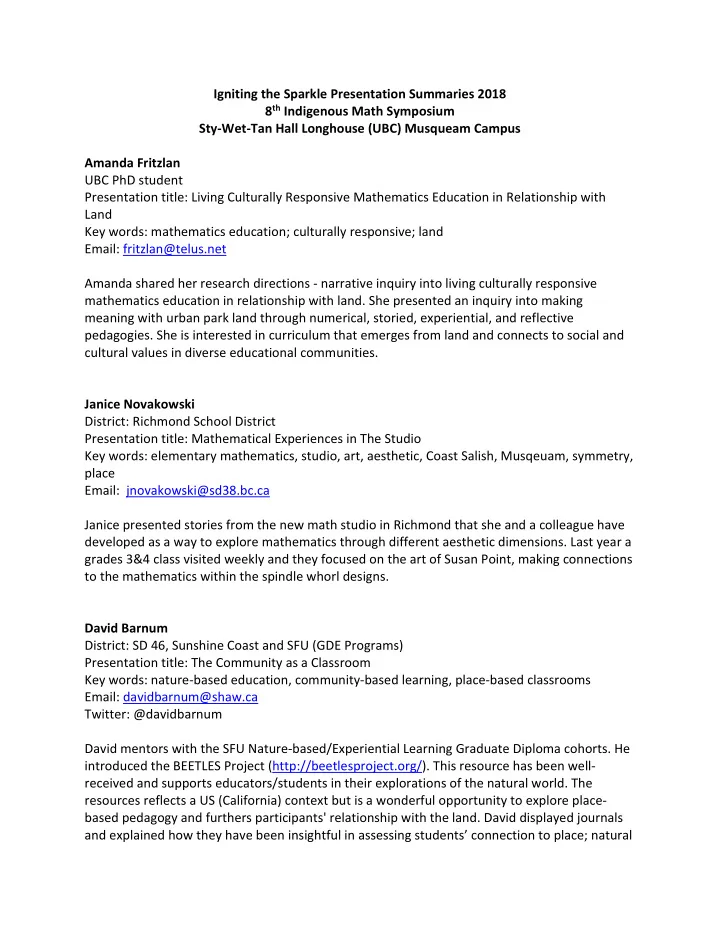

Igniting the Sparkle Presentation Summaries 2018 8 th Indigenous Math Symposium Sty-Wet-Tan Hall Longhouse (UBC) Musqueam Campus Amanda Fritzlan UBC PhD student Presentation title: Living Culturally Responsive Mathematics Education in Relationship with Land Key words: mathematics education; culturally responsive; land Email: fritzlan@telus.net Amanda shared her research directions - narrative inquiry into living culturally responsive mathematics education in relationship with land. She presented an inquiry into making meaning with urban park land through numerical, storied, experiential, and reflective pedagogies. She is interested in curriculum that emerges from land and connects to social and cultural values in diverse educational communities. Janice Novakowski District: Richmond School District Presentation title: Mathematical Experiences in The Studio Key words: elementary mathematics, studio, art, aesthetic, Coast Salish, Musqeuam, symmetry, place Email: jnovakowski@sd38.bc.ca Janice presented stories from the new math studio in Richmond that she and a colleague have developed as a way to explore mathematics through different aesthetic dimensions. Last year a grades 3&4 class visited weekly and they focused on the art of Susan Point, making connections to the mathematics within the spindle whorl designs. David Barnum District: SD 46, Sunshine Coast and SFU (GDE Programs) Presentation title: The Community as a Classroom Key words: nature-based education, community-based learning, place-based classrooms Email: davidbarnum@shaw.ca Twitter: @davidbarnum David mentors with the SFU Nature-based/Experiential Learning Graduate Diploma cohorts. He introduced the BEETLES Project (http://beetlesproject.org/). This resource has been well- received and supports educators/students in their explorations of the natural world. The resources reflects a US (California) context but is a wonderful opportunity to explore place- based pedagogy and furthers participants' relationship with the land. David displayed journals and explained how they have been insightful in assessing students’ connection to place; natural
and urban spaces. Further information on place-based frameworks: https://www.youtube.com/watch?v=98F2AxZwGAE&feature=youtu.be and http://teljournal.educ.ubc.ca/2017/05/open-minds-constructing-learning-in-the-community/ Lori Phillip District: School District 22 Presentation title: Key words: Email: lphillip@sd22.bc.ca Lori works in SD22's Aboriginal Education Department. Her department's job is to support Aboriginal student success. She presented a proposal to run a math skill building block for grade 8-10s at 2 high schools. The math skill building block will be for students struggling in math and who are interested in attending this block. Dana Bjornson District: School District 61 Presentation title: Third Space Learning: Creating non-oppressive learning spaces for all of our students. Key words: culturally responsive learning spaces; non-oppressive learning spaces; third space; collaborative learning; high school mathematics education Email: dbjornson@sd61.bc.ca Dana wanted to get ideas from the group that moves towards culturally responsive learning spaces in her high school math (and physics) classes. She presented a paper written last Fall for UBC's ETEC 521: Indigeneity, Technology, and Education. Dana shared the type of environment that she wants to cultivate in her classroom, but still need authentic ways to actually carry it out. Slidedeck: bit.ly/ams2018sharing Jesse Hills District: School District 47 Presentation title: Key words: Email: jhills@vsb.bc.ca AskiBoys (http://askiboyz.com/) is a TV show on APTN. Jesse’s class watched several episodes and invited one of the show's actors to come in and present/converse with the kids. Students really enjoyed the show and meeting the actor. Jesse presented his work with students and asked for suggestions on how to include math in this project.
Kim Padington District: SD72 (Campbell River) Presentation title: Georgia Park First Nation Math Kits (GPFNMAKT) Key words: Email: Kim.Padington@sd72.bc.ca First Nations Math Kits were developed at Georgia Park Elementary to supplement our school- wide inquiry questions which is: “In what ways have coastal First Nations peoples lived in harmony with the ocean.” The intention of these new math kits was to further incorporate First Nations perspectives and understandings with a focus on providing natural manipulatives and real-life scenarios in each kit. Five new kits available: 1. Math Adventures: Number Sense PURPOSE OF KIT: Students will explore and develop their ability to communicate their number sense (counting, ordering, sorting, patterning, matching) using stories, and manipulatives. 2. Math Adventures: Symmetry PURPOSE OF KIT: Value in balance and symmetry in everyday nature and man-made objects. 3. Math Adventures: Measurement PURPOSE OF KIT: to enable students to use stories and real events to predict, estimate, measure and develop a sense of importance in regards to time. How do First Nations use measurement to calculate items in their everyday living? For example, students can learn to calculate the volume of the gathering cedar baskets to find out how many berries need to be collected depending on the number of people, the size of the berries, and how many people each basket will feed. 4. Math Adventures: Spatial Relationships PURPOSE OF KIT: To further student’s understanding of First Nations objects that have different dimensional shapes (cubes-bentwood box, spheres- sun and moon, cylinders- totem poles, cedar trees) and to build traditional structures and technologies 5. Math Adventures: Economic Impact (supply and demand, money) PURPOSE OF KIT: Through game play and discussion, students will deepen their understanding of economics past and present through problem-solving, numeration (place value of whole numbers), and basic facts of addition and subtraction. Role- playing will also help to understand the importance and value on people (Europeans from Scotland and England, English and French Metis and First Nations people) and their items that they have to trade while learning the history of the Canadian country.
Sheloah Klausen District: North Vancouver School District #44 Presentation title: Key words: Email: sklausen@sd44.ca Sheloah shared an idea regarding the use of Salish forms in the teaching of algebra, and the presentation of equations as art. This idea seeks authenticity as well as accuracy.
Recommend
More recommend